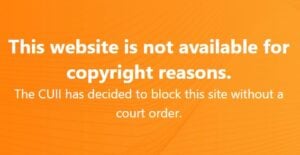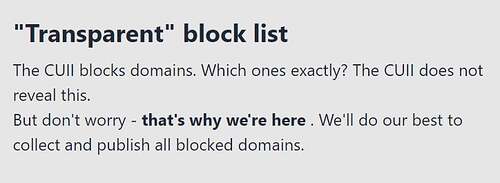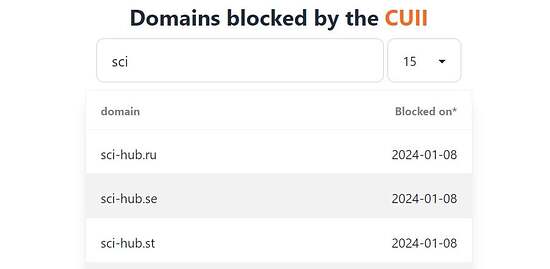17-Year-old Student Exposes Germany’s ‘Secret’ Pirate Site Blocklist
In Germany, several large Internet service providers are blocking notorious pirate sites. These actions are the result of a voluntary agreement with rightsholders, under which the affected domain names can’t be named. A 17-year-old student isn’t keen on this secrecy and, together with some friends, has released a dedicated portal exposing all blocked domains to the public.

In 2021, Germany joined a growing list of countries that have an institutionalized pirate site blocking scheme in place.
Several large ISPs teamed up with copyright holders and launched the “Clearing Body for Copyright on the Internet” (CUII), which is responsible for handing down blocking ‘orders’.
While CUII doesn’t rely on court judgments, there is some form of oversight. When copyright holders report a pirate site, a review committee first checks whether the domain is indeed linked to a website that structurally infringes copyrights.
What Sites are Blocked?
If a website overwhelmingly hosts or links to pirated material, the site can be nominated for a blocklist entry. This can apply to torrent sites, streaming portals, and direct download hubs, as long as piracy is front and center.
Germany doesn’t publish an official overview of the domain names subject to blocking. The decisions are public and often mention the target ‘site’ by name; domain names, URLs, and even the requesting rightsholders’ names are all redacted.
This ‘secrecy’ is not an oversight but a feature that’s codified in the agreement between rightsholders and Internet providers.
“The domains of the blocked [pirate sites], other domains and mirror domains, the applicants and their violated rights, as well as the names of the auditors are not mentioned,” it reads.
Transparency ‘Leak’
Secrecy surrounding blocked domains is frustrating for journalists and others who have a watchdog function. After all, without knowing which domains are blocked, it’s impossible to check for errors and overreach.
While there haven’t been any obvious errors that we’re aware of, access to information related to blocking would provide much needed transparency. With no information available from official sources, Damian, a 17-year-old German student, got together with some friends and embarked on a mission to fill in the blanks.
After sifting through the data and running domains though extensive DNS resolver tests, Damian launched CUIIliste.de, effectively lifting the blocking veil by exposing all URLs without redactions.
“The CUII blocks domains. Which ones exactly? The CUII does not reveal this. But don’t worry – that’s why we’re here. We’ll do our best to collect and publish all blocked domains,” the site explains.
CUIIliste.de (translated)
275 (sub)Domains Blocked
Thus far, CUII has published 21 blocking recommendations on its official website, without disclosing any domains. According to CUIIliste, this resulted in 275 blocked domains, including subdomains.
The blocking transparency portal offers a searchable list of the domain names, which will be updated after new blocks are discovered. For the shadow library Sci-Hub, for example, all main domains (sci-hub.se, sci-hub.st and sci-hub.ru) are off-limits.
The 275 number is a bit inflated, however, as it includes many subdomains such as ww11.kinox.to. ww14.kinoz.to and ww15.kinos.to, which likely exist to counter blocking measures. If we delete all duplicates, we end up with a list of 104 domain names.
Transparency & No Censorship
According to CUII, the blocking efforts don’t amount to censorship, as they only target structurally infringing domain names. However, without transparency, that claim is difficult to verify.
Damian and his friends make this task easier and their goal doesn’t stop there. In addition to providing transparency, they also advocate against censorship and for freedom of expression. The German blocking efforts go against this, they argue.
“CUII is a private organization that blocks websites that it believes violate copyright law – without any court orders. In addition, their approach seems very non-transparent in my opinion,” Damian writes.
To address the alleged censorship part, the site also links to various options available to the public to circumvent the blocking efforts. This includes switching to third party DNS resolvers.

